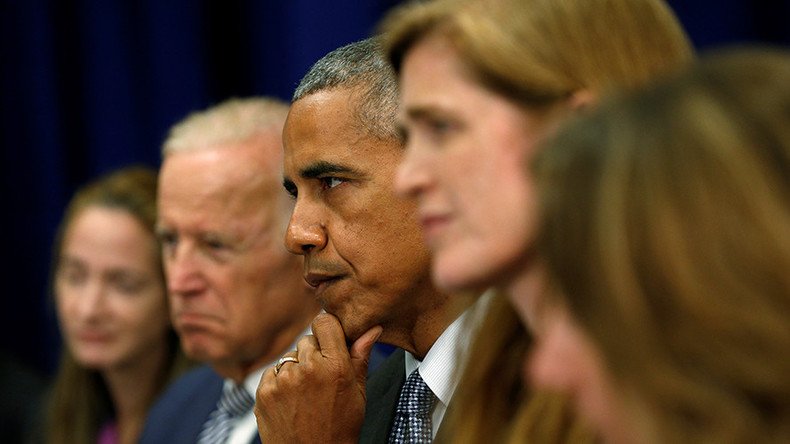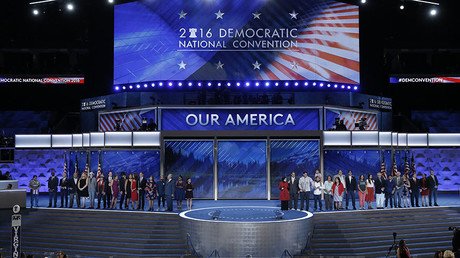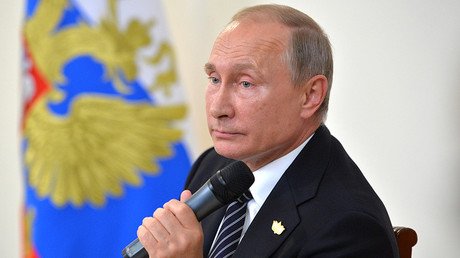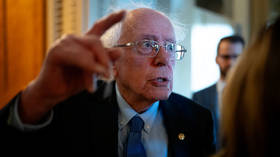US anti-Russia rhetoric goes nuclear with threats of covert cyber-attacks

The world seems to be sleepwalking its way into a geopolitical maelstrom as the US, increasingly paranoid over Russia, said it is considering a cyber-attack against the Kremlin in retaliation for purported Russian meddling in the US election process.
NBC News, citing those conveniently omnipresent “anonymous sources,” reported that the CIA is preparing to deliver ideas to the White House for "a wide-ranging ‘clandestine’ cyber operation designed to harass and ‘embarrass’ the Kremlin leadership,” as if dragging the Kremlin through the mud of the 2016 presidential campaign wasn’t embarrassing enough.
The report went on to say that the covert action plan, which is certainly no longer covert, “is designed to protect the US election system and insure that Russian hackers can’t interfere with the November vote (…) Another goal is to send a message to Russia that it has crossed a line.”
Before continuing, it is important to note that America’s electronic voting machines have long been vulnerable to hackers and vote riggers. And with all due respect to Russian ingenuity and resourcefulness, it was not the Russians who revealed that information to the Americans. In 2006, a group of computer programmers from Princeton University said they successfully created“vote-stealing software” that could be easily installed on a Diebold AccuVote-TS (the programmers, incidentally, admitted they acquired the voting machine “at a party”).
NBC then interviewed former CIA Deputy Director Michael Morell about Washington’s alleged plans to conduct a cyber-attack against Russia. Morell was against the covert cyber plan, but for all the wrong reasons.
“Physical attacks on networks is not something the US wants to do because we don’t want to set a precedent for other countries to do it as well, including against us,” he said. “My own view is that our response shouldn’t be covert – it should overt, for everybody to see.”
Incidentally, it was Morell who told Charlie Rose in August that“we need to make the Russians pay a price” - i.e. kill them - apparently for the Russian military's actions in Syria, which came as a shock given its success in routing Islamic State forces in the war-stricken Arab Republic.
NBC, as well as every other media outlet that has reported on the “Russian hacks,” failed to provide any concrete evidence of Russia “tampering in the US election process.” The NBC article, however, did prove that the Democrats, in a desperate bid to keep their Oval Office on Pennsylvania Avenue, will do whatever it takes to ‘help’ Hillary Clinton beat Donald Trump next month, even to the point of staging a zero-sum, take-no-prisoner poker game with Russia, the possible implications of which simply boggle the mind.
Political high stakes
Hunting season against the big, bad Russian bear opened in July this year, as WikiLeaks dumped a batch of incriminating emails showing that Hillary Clinton had received favorable treatment by the Democratic National Committee (DNC) over other presidential contenders, including Bernie Sanders. The scandal led to the resignation of Debbie Wasserman Schultz, the now-disgraced DNC chair.
Before WikiLeaks gleefully dumped the emails, the FBI had just concluded an investigation against Clinton for using her private server while handling thousands of government documents, many of them stamped 'classified.' The FBI, admitting the former Secretary of State had been “extremely careless” with her computer, recommended that no charges be filed against her. At this point, the reader may be asking: Okay, what does any of this have to do with Russia? That’s a very good question, and one that Russia is asking as well.
In fact, the only evidence is circumstantial, via a remark uttered by Donald Trump, who suggested - sarcastically - that Russia might want to help US authorities locate thousands of Clinton emails that mysteriously vanished in the ether.
“Russia, if you’re listening, I hope you’re able to find the 30,000 emails that are missing,” Trump quipped at a news conference in late July. “I think you will probably be rewarded mightily by our press.”
The Clinton campaign failed to see the irony of the comments, of course. Instead, it took Trump's words quite literally, peddling to a gullible public the story of deep collaboration between Donald Trump and Russian President Vladimir Putin. From there, rumors of a budding ‘bromance’ between Putin and Trump provided the necessary diversion to distract attention away from the explosive content of Clinton's emails, and to the fantasy land of “Russian aggression."
The Clinton campaign’s readiness to do whatever it required to win the White House was brought out in stark relief with the latest batch of leaked emails. The Young Turks, for example, found that Clinton was actually tipped off regarding a question on the death penalty that would be asked at the CNN Town Hall Debate against Donald Trump. The email in question was sent by Donna Brazile, who was then employed at CNN before becoming interim DNC Chair.
When Brazile was confronted with the allegations, she reacted by casually dismissing them. “I refuse to open them,” she remarked, talking about the proof of the leaks that had been sent to her email, of all places. “And I’ve asked the staff at the DNC and all of our Democratic allies, don’t open up that crap, because it’s postmarked from Russia.”
Clinton officials echoed Brazile’s comments, dubbing the popular whistleblower website a “propaganda arm of the Russian government.”
So just like that, yet another case of Clinton political chicanery, worthy of a Watergate-style investigation, is swept under America's carpet, while WikiLeaks and Russia are accused of working in tandem to stain the squeaky clean electoral process. And now here we are, with the Obama administration suggesting some sort of cyber-attack on Russia - a nuclear-armed country, by the way - over what really amounts to extreme misconduct at the highest levels of the Clinton campaign, with Russia being dragged in as scapegoat.
Meanwhile, Clinton's dogged insistence that Russia is somehow responsible for the hacked emails, which even the media has admitted it cannot prove, is forcing the outgoing Obama administration to act as if it is doing something about it.
On Friday, Vice President Joe Biden met “Meet the Press” host Chuck Todd for an interview that has raised serious concern in Russia.
Without bothering to question the validity of the claims, Todd took the allegations of Russian hacking at face value, opening his interview with a loaded question: “Why haven’t we sent a message yet to Putin?”
After a moment of deafening silence in which it was possible to hear the gears grinding in Biden's brain, the VP responded: “We’re sending a message. We have the capacity to do it and it will be at the time of our choosing, and under the circumstances that will have the greatest impact.”
When Todd asked if the public will know a message was sent, Biden replied, “Hope not.”
Now just try and square that. Biden tells Todd on national television that the United States will "send a message" to Russia that has the "greatest impact," yet he hopes the American public will not connect the dots and discover whodunnit.
The inherent danger of NBC News posting this story and interview is obvious. First, as has been said a hundred times already, there is zero proof to connect Russia to the alleged hacks; and if the Obama administration is sitting on evidence it defies logic not to provide that to the public. Furthermore, should Russia be hit one day by a cyber-attack in the near or distant future, the obvious temptation will be to pin the blame on the United States, and regardless of the state of bilateral relations at that time. So in that respect, the Obama administration is doing future US and Russian administrations a terrible disservice by uttering such mindless threats that will hang over US-Russia relations for as long as our technological societies are dependent on computer systems, i.e. a very long time.
In fact, this is not the first time that the brilliant idea of talking up a cyber strike on Russia has happened. In August, the influential Atlantic Council released a paper calling for Poland to ‘reserve the right’ to attack Russian infrastructure, including Moscow’s public transport and RT’s offices, via electronic warfare. One of the authors of that diabolical piece is an adviser to BAE Systems, Europe’s largest company in the Defence Sector. Go figure.
So whether Joe Biden is simply uttering election-year rhetoric to sway voter opinion no longer matters to Russia. Unsubstantiated claims of Russian hacking is one thing, but when the second-ranking US official not only joins the blame game, but asserts that Russia will be on the receiving end of a cyber-attack, well, we’ve clearly entered an entirely new dimension - a parallel reality, if you like.
On Sunday, Vladimir Putin emphasized that US threats of cyber-attacks do not correspond to the norms of international relations.
"The only novelty is that for the first time, on the highest level, the United States has admitted involvement in these activities, and to some extent threatened [us] – which of course does not meet the standards of international communication,” the Russian leader said.
“Apparently, they are nervous,” he added.
“One can expect just about anything from our American friends. After all, what did he (Biden) say that we didn’t already know? Didn’t we know that US authorities are spying and eavesdropping on everyone?”
Meanwhile, WikiLeaks expressed reservations over the seriousness of a covert cyberwar on Russia.
“If the US ‘clandestine’ pending cyberwar on Russia was serious: 1) it would not have been announced 2) it would be the NSA [National Security Agency] and not the CIA,” WikiLeaks wrote on Twitter.
Aside from the leaked emails from WikiLeaks, which are tossing a monkey wrench into the Democrat's election plans, there are many other issues affecting the cantankerous American campaign. Donald Trump, for example, has promised to severely scale back America’s military footprint around the world, as well as end military campaigns that are drying up US finances. This is the very last thing the elite and the powerful military-industrial complex want, and they are willing to do anything – including lying through their teeth about Russian hacking – to ensure that Clinton gets into the White House and maintain the status quo.
If the US "clandestine" pending cyberwar on Russia was serious:
— WikiLeaks (@wikileaks) October 15, 2016
1) it would not have been announced
2) it would be the NSA and not the CIA
Regarding the claims of a possible cyber-attack on Russia, there are also grounds for taking this report with a generous handful of salt. First, Barack Obama is presiding over the remaining lame-duck days of his 8 years in office. And lately there have been disturbing signs of a mutiny of sorts inside his administration.
In June, for example, dozens of State Department diplomats, apparently upset with Russian military's successes in Syria, signed an internal memo calling the United States to carry out military strikes against the government of President Bashar al-Assad, which sounds curiously like the position many predict Clinton will take should she reach the White House.
Since the NBC News report of an alleged plan to conduct a cyber-attack on Russia contained not a single named source, not to mention the futility of publicly declaring a "covert" operation, this may be nothing more than a case of the US mainstream media unilaterally poking the hornets nest, agitating Russia, while creating a perfect smokescreen to conceal the misconduct of their obvious favorite candidate - Wall Street-approved, Neocon-supported, Hillary Rodham Clinton.
The statements, views and opinions expressed in this column are solely those of the author and do not necessarily represent those of RT.
















